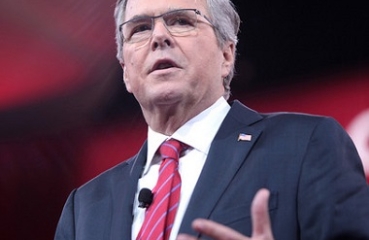The school choice movement's schisms, explained
Michael J. PetrilliBy Michael J. Petrilli
Student-teaching experiences’ effect on teacher effectiveness and attrition
Amber M. Northern, Ph.D.By Amber M. Northern, Ph.D.
The Snowzilla edition
In this week's podcast, Mike Petrilli and Brandon Wright explain the schisms in the school choice movement, defend career and technical education programs, and discuss Eva Moskowitz’s big speech on school discipline. In the Research Minute, Amber Northern describes the effect of teacher turnover and quality on student achievement in District of Columbia Public Schools.
Increasing identification of gifted learners from diverse backgrounds
The differential representation of some student populations in advanced academic programming has long been recognized as a glaring weakness of gifted education practice.
School choice: The end of the beginning
I’ve dedicated a big part of my career to expanding school choice. I think it’s the right thing to do for kids, families, educators, neighborhoods, civil society, and much else. In fact, I’m convinced that years from now, students of history will be scandalized to learn that we used to have a K–12 system defined by one government provider in each geographic area.
ESSA Accountability Design Competition: Meet the Judges
Michael J. PetrilliUnder the newly enacted Every Student Succeeds Act (ESSA), states now face the challenge of creating school accountability systems that can vastly improve upon the model required by No Child Left Behind (NCLB).
A guide for K–12 gardeners
Fordham’s exceptional study illuminates school choice in thirty cities and how it can improve nationwide. By Frederick M. Hess
Coming soon - Quality in Adversity: Lessons from Ohio's best charter schools
Ohio Education GadflyListening to some of the most important voices in the charter school debate
Public private districts and open enrollment
Aaron ChurchillMany of Ohio's best districts are closed to open enrollment
In 2016, every week is School Choice Week
Kevin MahnkenIf it isn’t already clear, let the Fordham Institute be the first one to state it outright: National School Choice Week 2016 has been a smashing success. The foundational principle of our movement—that every family deserves access to varied and excellent education options—has been expounded by an array of stirring speakers.
More than meets the eye: Ohio’s unimpressive charter law ranking
Jamie Davies O'LearyLooking behind the latest NAPCS rankings
Don't blame Common Core for publishers' lousy textbooks
Kevin MahnkenIf you’ve been keeping up with the Common Core scandal pages, you may be wondering who Dianne Barrow is.
Is Ohio education fracturing the American Dream?
Jessica PoinerTwo national reports grade Ohio poorly; signal trouble
NAEP computer-based writing pilot assessment: Fourth-grade performance
Amber M. Northern, Ph.D.A new study from the Department of Education’s Institute of Education Sciences provides results for fourth-grade students on the 2012 NAEP pilot computer-based writing assessment. The study asks whether fourth graders can fully demonstrate their writing ability on a computer and what factors are related to their writing performance on said computers.
Governing urban schools in the future: What’s facing Philadelphia and Pennsylvania
Chester E. Finn, Jr.Urban school governance is a moving target, in part because it’s pretty clear that there’s no best way to handle it and in part because no change in a city’s arrangements ever works as well as its promoters hoped.
Rays of hope in the Sunshine State
The Education GadflyOn the same day that Jeb Bush unveiled his education agenda, thousands of families in his home state marched in Tallahassee to support some of the very school choice programs he championed in office.
Free tuition is a needless windfall for affluent voters and state institutions
Michael J. PetrilliNothing in life is truly free—but don’t tell that to dogmatic liberals and their pandering politicians, who would turn the first two years of college into a new universal entitlement. This idea has the same fatal flaws as universal preschool: a needless windfall for affluent voters and state institutions that does very little to help the needy.
The presumption that individuals of one racial group are smarter than others is a myth and stereotype
Joy Lawson DavisThe presumption that individuals of one racial group are smarter than others is a myth and stereotype. Even efforts in the early twentieth century to align high intelligence with the majority or white culture were refuted. The groundbreaking work of Martin D.
The Bush education plan
Chester E. Finn, Jr.Education reform has been a specialty of Jeb Bush’s, and his track record on this issue in Florida is unbeatable. He knows the topic up, down, and sideways.
Ten things every American should know
Robert PondiscioNearly thirty years ago, a then-obscure University of Virginia professor named E.D. Hirsch, Jr. set off a hot national debate with the publication of Cultural Literacy.
Has your child's elementary school stopped teaching history, science, and other content? Here's how to do it yourself
Michael J. PetrilliIn a perfect world, all children would have access to an inspiring, well-rounded education, especially in pre-K and elementary school. They need a solid grounding in history, science, art, music, and literature.
Can parents help with math homework? YES
Jason Zimba, Ph.D.My wife and I both spend time working with our kids on their homework. We have also made a family tradition of “Saturday School,” a routine that my wife and I instituted a couple of years ago because our kids’ school was using a pre-Common Core math curriculum that wasn’t keeping pace with the standards.
A fair shot at opportunity
Editor's note: This is the first in a series of blog posts that will be collaboratively published every Wednesday by the National Association for Gifted Children and the Thomas B. Fordham Institute. Each post in the series will exist both here on Flypaper and on the NAGC Blog.
The El Chapo edition
The Friedrichs case and the future of teacher unions, whether schools are asking too much of young students, debating the role of federal regulation under ESSA, and computers’ effect on the writing gap. Mike Petrilli and Robert Pondiscio cohost, and Amber Northern delivers the Research Minute.
AP at scale: Public school students in Advanced Placement
Kevin MahnkenThe expansion of the Advanced Placement program, on its face, is one of the great feel-good stories of education in my lifetime. Instead of being relegated to a boutique résumé item on the college applications of America’s most fortunate high schoolers, AP has broadened access to its more rigorous curriculum to kids across the country.















